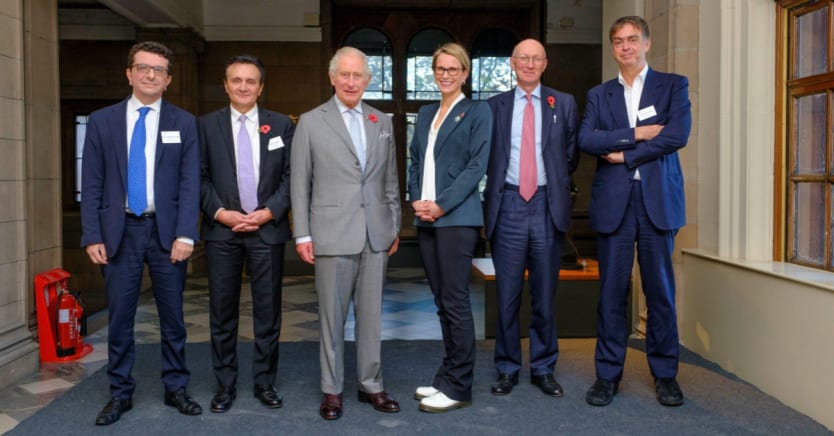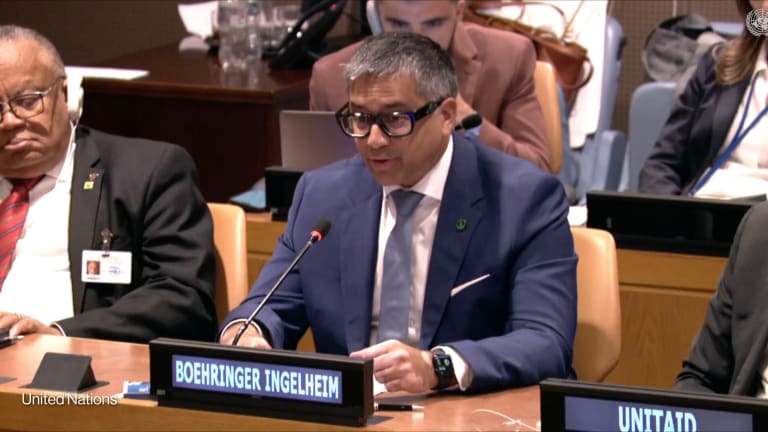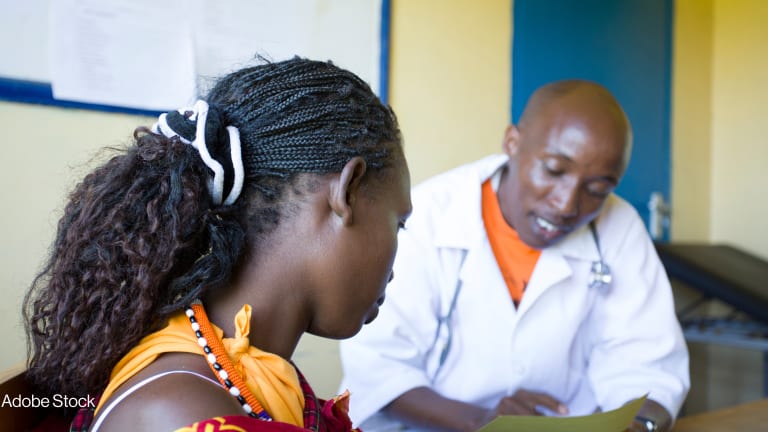Opinion: Taking collective action to decarbonize the health care sector

The relationship between climate change and global health is deeply interconnected. From air pollution to flooding, extreme heat to drought, climate change is already impacting our lives and health in increasingly debilitating ways. The World Health Organization estimates that nearly 14 million people die each year from environmental health risks, including 7 million from air pollution alone. Heat-related deaths are increasing, causing a rise in hospital admissions as well as in cardiovascular, kidney, and respiratory illnesses.
Extreme weather events continue to disrupt vital food systems and undermine many of the social determinants for good health, such as livelihoods, equality, and access to health care itself. This is particularly impacting the most vulnerable populations, including the 1 billion children at extremely high risk from the impacts of the climate crisis.
The Sustainable Markets Initiative (SMI) Health Systems Taskforce was convened at the invitation of His Royal Highness the Prince of Wales and comprises CEOs or equivalent-level representation across the health care sector with a shared ambition to accelerate the delivery of net-zero, sustainable health care to improve individual, societal, and planetary health.
To avert some of the most devastating consequences for global health, our world must aim to limit the temperature rise to 1.5°C. It is estimated that even an additional half-degree increase (from 1.5° to 2°) could almost double the number of people exposed to heat waves, meaning every fractional reduction will reduce the risk of heat-related death.
Every sector has a role to play in combating the climate crisis and building a more sustainable future.
The role of the health care sector
The health care sector has shown throughout the COVID-19 pandemic that it can rise to the greatest challenges of our time. Now, it must play its part for the health of our planet.
In the course of developing life-saving treatments and delivering patient care, the health care sector is responsible for approximately 4% to 5% of global greenhouse gas emissions per year. We need to take action now to ensure that the health care sector is part of the solution.
That is why we came together with His Royal Highness The Prince of Wales at the 26th United Nations Climate Change Conference of the Parties in Glasgow to form the Health Systems Taskforce as part of the Sustainable Markets Initiative. We are united around a common ambition to accelerate the delivery of net-zero health care — for the health of people, society, and our planet.
As a public-private partnership, we are committed to driving action across three essential areas: digital health care, supply chains, and patient care pathways. Our aim is to decrease the environmental footprint of our health systems while improving health outcomes.
According to a Boston Consulting Group initial analysis based on publicly available information, at least 50% of health care emissions derive from the product supply chain, which includes the making, packaging, and transportation of medicines. The majority of the remaining emissions come from patient care settings, such as the heating and cooling of hospitals, delivery of care, and patient transport.

Call for action
This World Environment Day, we are encouraging everyone involved in health care delivery to consider how they can contribute to the decarbonization of the sector. We believe there are three key priority areas where sustainable impact can be made:
• First, decarbonizing health systems’ supply chains, especially upstream at the start of the development and manufacturing process. This can be achieved through transitioning to clean heat and renewable energy, using low-carbon ways to transport medicines and products, and enacting supplier commitments to science-based targets.
• Second, improving patient care pathways that result in better patient outcomes and lower emissions. We must try to limit the progression of illness through prevention, early detection, and optimized treatment. These factors all contribute to keeping people healthy and out of the hospital, benefitting both people and the planet. Improving energy usage in health care facilities is also critical, and greater investment and deployment of green energy is key.
• And third, increasing the uptake of digital innovation including digitally-led clinical trials and remote monitoring. This can improve patient experiences and outcomes, increase efficiency of clinical practice, and thus reduce emissions and relieve the burden on health systems.
All stakeholders within the health care ecosystem — from providers, practitioners, and payers to industry, policymakers, academia, regulators, governments, and patients — can contribute to driving action at scale by playing their part.
It is encouraging to see the G-7 and G-20 economies prioritizing the link between health and climate this year, as well as around 60 countries signing up to the COP 26 Health Programme to build climate resilient and low-carbon health systems. Best practice sharing and open engagement across borders is critical.
Later this year we will be sharing detailed, evidence-based recommendations to help drive positive change. There are, however, concrete steps that organizations across the sector can take in the short term to lower emissions across the health care value chain, including:
1. Committing. Defining short-term science-based targets for the reduction of GHG emissions on the journey to net-zero.
2. Disclosing. Strengthening emissions reporting practices, such as by disclosing emissions through CDP, and by requiring suppliers to share emissions data.
3. Implementing. Procuring renewable power, switching to renewable heat sources, and identifying opportunities to reduce energy usage as well as waste. Moving to greener options for transportation is also key.
The ultimate aim of the health care sector is to protect, improve and save lives. We must never lose sight of the fact that one of the best ways to decarbonize health care is to prevent people from getting sick — by promoting healthy lifestyles, healthy diets, and timely vaccinations, and by empowering individuals, families, and communities to take charge of their own health.
As a collective, we are committed to working together and learning from each other and the health care ecosystem at large to effect sustainable change — for healthy people and a healthy planet.
This opinion piece has been co-authored by SMI Health Systems Taskforce members:
• Dr. Fiona Adshead, chair, Sustainable Healthcare Coalition.
• Lars Fruergaard Jørgensen, CEO, Novo Nordisk.
• Belén Garijo, CEO, Merck.
• Dr. Tedros Ghebreyesus, director-general, World Health Organization.
• André Hoffmann, vice chairman, Roche.
• Paul Hudson, CEO, Sanofi.
• Prof. Ole Petter Ottersen, president, Karolinska Institutet.
• Lord Prior, former chair, NHS England.
• John Rim, CEO, Samsung Biologics.
• Catherine Russell, executive director, UNICEF.
• Pascal Soriot, CEO, AstraZeneca.
• Prof. Francesco Svelto, rector, Pavia University.
• Dame Emma Walmsley, CEO, GSK.
Search for articles
Most Read
- 1
- 2
- 3
- 4
- 5








